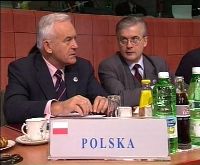Europe can slip into political crisis in case Poland blocks deal on EU treaty
Europe can slip into a political crisis if Poland blocks an agreement at next week's European Union summit on how to proceed with the failed EU Constitution.

Poland is threatening to veto a deal on the future of the charter, refusing to accept changes to the voting system envisaged under the draft treaty that was rejected by French and Dutch voters in 2005 referendums.
"Poland will put Europe into a crisis with this veto," European Parliament President Hans-Gert Poettering said. "No small or middle-sized country should impose its will on another country."
"Poland would harm itself the most if it uses this veto ... Poland needs solidarity too, after all," he said.
Poland argues the new qualified majority rules designed to reduce the individual countries' bargaining power favor big countries such as Germany. The system calls for a double majority representing at least 55 percent of the EU member states and at least 65 percent of the EU population.
German Chancellor Angela Merkel, whose country holds the rotating EU presidency until the end of June, is pushing leaders to agree on which parts of the blueprint can be salvaged and which need to be amended or dropped, with a view to adopting the revised charter in 2009.
Poland calls for a different voting system, based on the basis of a mathematical calculation of a number of inhabitants in relation to the country's surface area. Polish Prime Minister Jaroslaw Kaczynski has said it was "worth dying for" the so-called "square root system."
Poland's veto threat is "very regrettable, not just in terms of the possible outcome but in terms of the threat itself," Poettering said.
Poland stands to gain massive benefit from EU subsidies in the next six years, with billions of euros (dollars) to flow into the new member states.
The draft EU treaty aims to streamline EU decision-making, enhance the bloc's international role and prepare it to accept more member states. Eighteen countries have ratified it.
Poettering said the Poles were isolated in their efforts to have the voting system changed, with perhaps only the Czechs on their side.
Britain and the Netherlands are the other two countries with major reservations to the draft. Britain is concerned about losing veto power over areas such as justice and home affairs, and together with the Dutch and the Czechs back a scaled-down charter with no constitutional elements.
France is pushing for a 'simplified treaty that could be put to the French parliament for approval.
Kaczynski complained Monday that he would get background documents for the June 21-22 summit from the German presidency only on June 19, which he said was too late.
He said he did not favor "dealing in just a few days with issues that are key to Europe's future."
Subscribe to Pravda.Ru Telegram channel, Facebook, RSS!




